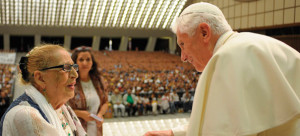By Carol Glatz
VATICAN CITY (CNS) — Pope Benedict XVI prayed that the world’s Gypsies no longer be subjected to prejudice, oppression and rejection.
Gypsies should always uphold “justice, legality, reconciliation and strive to never be the cause of someone else’s suffering,” he said in a festive meeting with nearly 2,000 Gypsies, Roma, Sinti and Travellers in the Vatican’s Paul VI hall June 11.
Pope Benedict recalled the painful past of the Gypsies, especially when hundreds of thousands of men, women and children “were barbarically killed in extermination camps” during World War II.
He acknowledged that even today, many Gypsy communities and individuals still face “serious and worrying problems, such as often-difficult relations with the societies in which they live.”
Europe must not forget the suffering the Gypsy people went through, he said, launching an appeal that Gypsies “may no longer ever be the object of oppression, rejection and contempt.”
The pope also asked the Gypsy communities to do their part and respect local laws and be good citizens.
He called on Europe and Gypsies to collaborate more closely and “write a new page of history together.”
Governments need to do more to help Gypsies integrate into society, he said.
“The search for housing, dignified employment and an education for one’s children are the foundations upon which to build that integration from which you and all of society will benefit,” the pope told his audience.
The papal meeting coincided with a pilgrimage to Rome to mark the 150th anniversary of the birth of Blessed Ceferino Gimenez Malla, a Gypsy who was shot in 1936 after defending a priest during the Spanish Civil War.
Pope Benedict said Blessed Gimenez, a Third Order Franciscan, was an important model for today because of his dedication to prayer, the rosary and the sacraments as well as his commitment to honesty, charity and generosity.
Before the pope’s address, four Gypsies, including a Slovakian nun, told the pope about how their Christian faith was an important part of their lives, especially in giving them hope for the future.
One of the Gypsies, Ceija Stojka of Austria, told the pope she was confined to three Nazi concentration camps when she was nine years old. Of 200 people in her family, only six survived the war and the Holocaust, she said.
While it is impossible for her to forget seeing people killed in front of her and the smell of burning bodies, Stojka said she is afraid that Europe is forgetting its past and that “Auschwitz is only sleeping.”
Anti-Gypsy threats, policies and actions “worry me greatly and make me very sad,” she said.
“If the world does not change now, if the world does not open its doors and windows, if it does not build peace — true peace — so that my great-grandchildren have a chance to live in this world, then I cannot explain why I survived Auschwitz, Bergen-Belsen, and Ravensbruck,” she said.
Pamela Suffer, a 28-year-old Italian Sinti, told the pope that “before the Lord Jesus I never felt different or strange. I know that people look at appearances, but the Lord looks at your heart.”
Carlo Mikic, an 18-year-old Roma from Italy, said he understood many people’s prejudices against Gypsies are rooted in the instances of crime by some members of their community, but that it was wrong to place the blame on a whole ethnicity or people for the wrongdoings of an individual.
He said he dreamed of a future in which Gypsies would be treated like full citizens and that they would no longer be a people “to be isolated or feared.”
